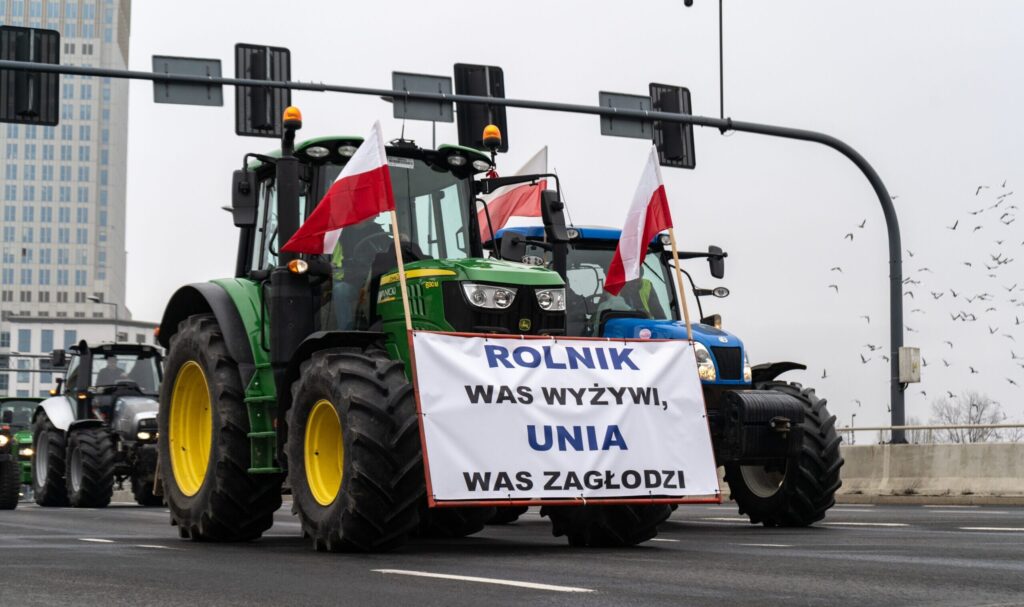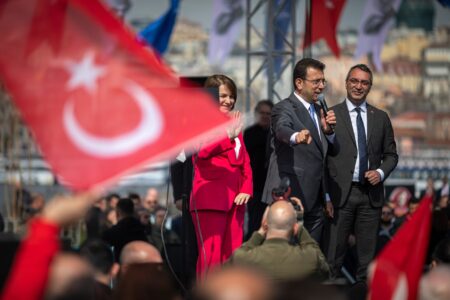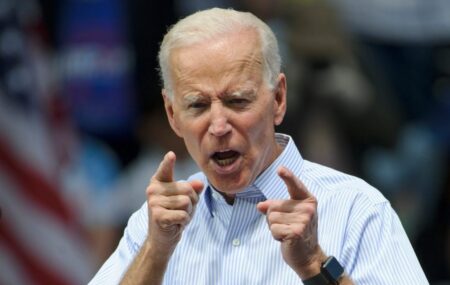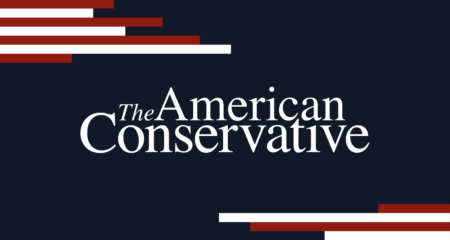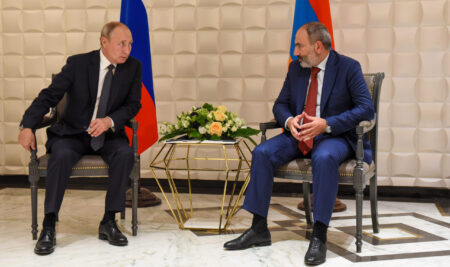Poland is not a country in which left-liberal policies should go unchallenged. Among Europe’s large nations, it is arguably the most religious and conservative. A defiant independence has long emanated from Warsaw. Politicians from both American parties have sought favor there. EU devotees, too, have jockeyed for hearts and minds along the Vistula.
Nonetheless, a period of weakness on the right is giving the country’s new government carte blanche to reshape society according to Western establishment dogma. Transgender soldiers, abortion on demand, and so-called hate-speech laws are firmly on the agenda less than three months into the new government’s tenure. No domestic political solution figures to materialize in the short term. Polish Catholics, traditionalists, and globalism skeptics are in for a bumpy ride.
This political disequilibrium is undoubtedly one of the reasons Poland has become a flash point in Europe’s recent wave of farmer protests. On Tuesday, an estimated 10,000 farmers marched on Warsaw to demand concessions from the government. Their two central grievances are the burdensome agricultural stipulations of the “European Green Deal” initiatives and the unchecked flow of agricultural products from neighboring Ukraine. The latter policy, implemented in the EU after Russia’s invasion two years ago, has lowered the prices Polish farmers can command and consigned them to a cost disadvantage, as Ukrainian products are not subject to EU quality regulations. Farmers have blocked border crossings and critical roadways in response to a perceived lack of government action. In some cases, they have dumped Ukrainian grain shipments.
Both issues should be understood in a Polish context. The European climate-policy debate tends to pit the comparatively poor East and South of the continent against the Northwest. The former sense policy action favorable to the Old Europe, particularly Germany. An average Polish worker, still earning far less than a German peer, might cite hubris for Germany’s likely recession, which is widely perceived to be self-inflicted in the name of climate purity. Indeed, protesters have blocked key roadways to Germany, in addition to those at the Ukrainian border.
The dispute over agricultural imports is uniquely Polish. Poland has arguably shouldered a heavier economic and humanitarian burden from the war than any country outside the United States and Ukraine itself. Its uncompromising stance toward Russia strained regional alliances, and it cultivated unusual political friendships between the former right-wing government and its counterparts in Washington and Berlin, at least before the election campaign began in earnest. Ukrainians have enjoyed favorable housing loans and child-tax credits. None of this has been particularly controversial. While last year’s election campaign was bitter, the opposing camps held largely the same stance on Ukraine policy. After two years, heavily strained sectors like agriculture are finally reaching their breaking point.
Public opinion also should be understood in a Polish context. Foreign outlets like Deutsche Welle and the Wall Street Journal have claimed ubiquitous “far-right” elements and Russian propagandists are orchestrating the protests, but 78 percent of otherwise-divided Poles support the farmers. Nonetheless, protest leaders admitted Tuesday’s talks with government figures “did not yield any specifics.” The next protest is scheduled for March 6.
The farmers might have elicited more sympathy from the previous government led by the Law and Justice (PiS) party, which effectively wielded single-party rule from 2015-23. PiS consolidated power on the right and made Poland a stalwart of European conservatism, but it grew complacent, abrasive, and repellent to potential allies in recent years. In an environment of long-term economic growth and popular government policies toward Ukraine, the election nonetheless proved a referendum on the political persona of PiS. In October, PiS won the highest vote total with 35.4 percent, enough for its third straight top finish, but no coalition partner could be found. In bordering Slovakia, which held elections the previous month, a mere 22.9 percent was enough for the controversial Robert Fico to form a government and embark on a fourth term. PiS, by contrast, had become a pariah.
The new government has wasted no time in trampling on Polish society and culture. After feigning hesitation, the nominally centrist Third Way coalition confirmed it would get in line on pro-abortion legislation; it was a mandatory stance in second-time Prime Minister Donald Tusk’s Civic Coalition. The newly created Minister of Equality is working with the Ministry of Justice to craft a “hate-speech” bill. The Ministry of National Defense announced, “[W]e take seriously the problem of difficult access to military service for transsexual and intersex people and are analyzing the possibility of changing the provisions in this area.” Marshal of the Sejm (akin to Speaker of the House) Szymon Hołownia posed for a photo in parliament with a group of illegal migrants and NGO activists just days after taking office. An education reform abolished homework under age 15 and stripped major elements of Polish history and literature and the Catholic faith from the curriculum; a concurrent teacher-pay increase tempered resistance. (Ironically, this article is a result of countless hours of Polish-language homework. Perhaps that is the point.)
After employing continual “rule of law” rhetoric during the campaign, the new government has raided the public television headquarters and seized political prisoners in the Presidential Palace. Sympathetic western media have provided air cover for these gangster tactics. President of the European Commission and Tusk ally Ursula von der Leyen hasn’t pretended the EU’s freezing of funds to Poland, totaling €137 billion, was about anything other than politics.
Damningly, PiS hasn’t converted this string of atrocities into political capital. In fact, some recent polls have suggested the party no longer garners the largest share of voter support, a development that never occurred during last year’s campaign. It all cries out for reform.
PiS has replaced key leadership figures with politicians wielding more influence in Brussels. It has selected 36-year-old rising star Tobiasz Bocheński as its mayoral candidate in liberal Warsaw, where a respectable showing might portend a presidential candidacy in 2025. Yet a retirement announcement from the polarizing PiS boss and former Prime Minister Jarosław Kaczyński is the one personnel change that might move the needle, and it does not appear forthcoming. Unseated Prime Minister Mateusz Morawiecki, whose political shortcomings grew apparent in last year’s campaign, also remains in the upper echelons of party power.
The party appears uncertain how to navigate its newfound parliamentary isolation, combined with a leftist media environment and openly hostile governments in key western capitals. Polish conservatives increasingly place their hopes in the veto power of President Andrzej Duda and the prospect of a second Trump administration in the United States. The Polish right has never been weaker in recent memory.
Deprived of a political outlet, Polish conservatives are forced to vent frustrations through channels like the recent farmer protests. Keep an eye on November’s Independence March, an annual manifestation of the political right that Tusk has sought to suppress. By that time, Poles might well have had enough of this runaway government train. They should also know the results of the previous week’s U.S. elections. It figures to be an important week in Polish politics. But will it be a productive one?
Read the full article here




